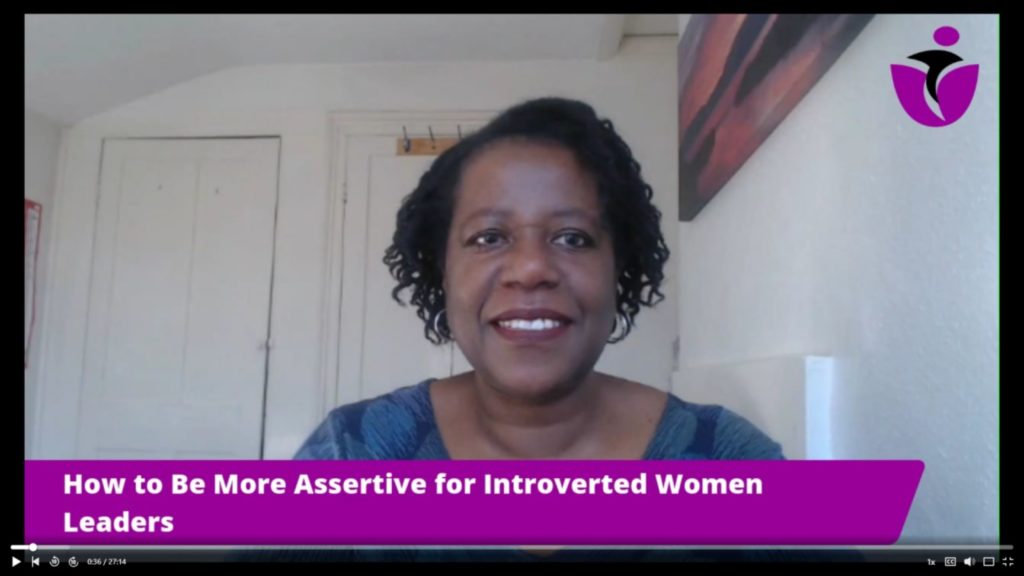I recently did a LinkedIn live about how to be more assertive for introverted women leaders. If you didn’t get chance to join in, you can watch the replay at the link here:
https://www.linkedin.com/video/live/urn:li:ugcPost:6851486290332962817/
Pushed for time? Here is a summary of what I covered:
Be assertive, NOT passive, or aggressive
Psychologist Dr Randy Paterson offers a good analogy that illustrates the differences between passive, aggressive and assertive. He likens it to being on a stage. For passive people, the world is allowed on the stage, but the passive person’s role is to be the audience and supporter for everyone else. They let everyone onto the stage but themselves.
People who are aggressive want the stage for themselves and don’t want to let anyone else onto the stage. They want centre stage and spend most of their time shoving other people off it. People who are assertive recognise there is room for everyone on the stage and they allow other people to be on stage with them.
This is a helpful analogy to use to reflect on how you behave in different situations. Are you in the audience, letting everyone but yourself on the stage? Or are you shoving everyone off because you want the stage for yourself? Or are you on the stage with everyone else and recognise that there’s room for everyone?
What gets in the way of you being assertive?
It is helpful to know what is behind your lack of assertiveness. To get an understanding of what this is (if you don’t already know), think about situations where you are assertive, what is going on for you? In those situations where you are not, what is going on? What is the difference?
One participant responded that they are assertive when they perceive an injustice against others, but passive when it is them not being treated the right way. This is something I see quite often with women. When it comes to a cause or person that they care about, they confidently assert themselves. Yet when it is something that focuses on them, it is more challenging to do so.
Examining your thoughts and what you believe about yourself in those situations where you find it hard to assert yourself will help you to rationalise things and put things into perspective. For example, a client who came from a disadvantaged socio-economic background, would find it difficult to assert herself in meetings with Oxbridge educated, domineering men.
Although she had worked hard to get to where she was, at the root of it, she didn’t feel as if she was good enough. By us addressing this, she was able to confidently speak up and assert herself in those environments.
Someone asked the question whether you should start by addressing the root of what makes it difficult to be assertive, and added that it can be very deep. My response was that whilst it is possible to learn to adopt the behaviours required to be assertive without addressing the root cause, I believe in addressing the root of it.
I liken this to a garden weed and just cutting it back to beneath the surface of the soil. It eventually grows back. Removing the weed from the root, stops it from growing back. If addressing the root and the issue is very deep rooted (and involves trauma in particular), it is important to get the right support.
Speak firmly and authoritatively when others try to interrupt
When speaking be specific, be clear and be concise. If you find your voice speeding up because you want to hurry and get what you have to say out of the way, slow it down. If people talk over you, use a firm tone, and continue to speak.
If they raise their voice at you, ask them what their reason is for doing this. They might not be aware of their behaviour, and you pointing it out to them may help them reflect (and hopefully see) that their behaviour is inappropriate.
I frequently come across women who find it difficult to assert themselves when there are domineering personalities talking over them. They apologise and let the other person carry on, rather than asserting themselves and continuing to finish what they started saying. Be mindful of using apologetic language.
Show others that you mean business and that you are not a walkover
Your body language can help project self-confidence and assertiveness so be mindful of your body posture so adopt a confident stance. This applies whether you are at an in person meeting or a virtual one.
Look people in the eye when speaking to them but don’t glare or overly stare. Avoiding eye contact can make you seem unsure of yourself or insecure. However, be mindful of the culture you are in, because in certain cultures making too much eye contact is seen as disrespectful.
Be aware of your facial expressions so you can make sure they convey the message you want to get across in the right way. For example, smiling when you are delivering a serious message, may make your message lose its punch.
If you find it challenging being assertive in particular environments and when around certain people, keep practising being assertive and you will strengthen your assertiveness muscle.
First published on LinkedIn.
If you are an introverted woman and a senior leader and want to increase your confidence, influence and impact, take my free assessment and get a report identifying areas to develop. You can take the assessment here.

